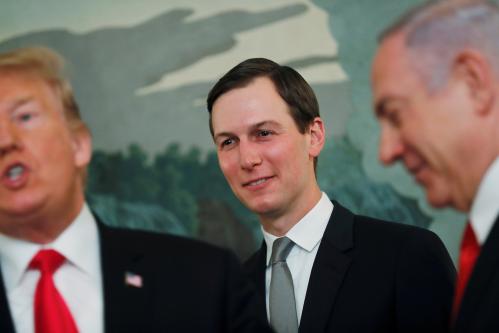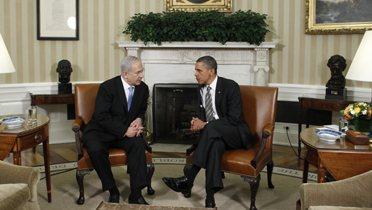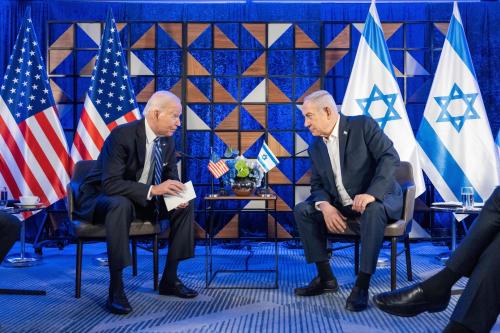Since last week’s meeting between Israeli Prime Minister Benjamin Netanyahu and President Donald Trump, much has been written about how in sync the two leaders appeared, as if they were using the same talking points. I had a different take on the visit. On virtually all of the major issues, Trump’s remarks were at best incoherent, at worst counter to the interests of Netanyahu and his coalition. Netanyahu’s supporters in Israel and the United States should view the meeting with caution, not celebration.
Two-State Solution
Many U.S. papers (as well as some members of Netanyahu’s own government) interpreted Trump’s remarks as the death-knell for the two-state solution, with headlines like, “Trump Drops Push for Two-State Solution” and “Trump Backs off Two-State Framework.” In contrast, I believe his remarks reveal how little Trump understands about the Israeli-Palestinian conflict.
First, if the president really supports “the one [deal] that both parties like,” that would point toward support for the two-state solution, which remains the stated position of Netanyahu and Palestinian President Mahmoud Abbas, as well as the preference of the majority of Israelis and Palestinians.
Second, if Trump really doesn’t care what the final deal looks like—one state, two states, three states, four, which would make sense with his real estate worldview—Netanyahu and his supporters should be very worried. Trump himself said during the presser, “I think our new concept that we’ve been discussing actually for a while is something that allows them to show more flexibility than they have in the past because you have a lot bigger canvas to play with.”
This last phrase—a “bigger canvas” —is both bizarre and disconcerting for all sides. It implies that Trump has no understanding of the importance of each people’s connection to the land and that he might push for a completely wacky arrangement whereby Israel is divided up among the Arab states or Israel attempts to expand beyond the West Bank and Gaza. Or he could be referring to the completely unreasonable suggestion that Jordan or Egypt absorb the Palestinians into their states (as was reportedly discussed in a proposed 2014 Egyptian deal that the Palestinians rejected and Egypt denied).
Settlements
While Bibi might believe he can change Trump’s mind, something has clearly convinced Trump—for now—that settlements matter.
On the issue of settlements, the two leaders clearly hold divergent opinions. After initially stating, “While we don’t believe the existence of settlements is an impediment to peace, the construction of new settlements or the expansion of existing settlements beyond their current borders may not be helpful in achieving that goal,” Trump shifted his position, noting that “I am not somebody that believes that going forward with these settlements is a good thing for peace.” And in the press briefing with Netanyahu, he reiterated this point, saying directly to Bibi, “I’d like to see you hold back on settlements for a little bit.” While Bibi might believe he can change Trump’s mind, something has clearly convinced Trump—for now—that settlements matter.
Jerusalem
Trump has masterfully slow-rolled his campaign promise of moving the U.S. embassy to Jerusalem. While he repeatedly reassured right-wing Israelis and their supporters in the United States that this was one of his top priorities in the days leading up to his inauguration, Trump’s comments during his joint press briefing with Netanyahu suggested far less urgency. This is now the second time that Trump has said his team is studying the embassy move. But in this latest iteration Trump was even less committal, “We’re looking at it with great care—great care, believe me. And we’ll see what happens.”
Making a Deal
Even if Trump and Bibi really are simpatico on all the final status measures, it is highly unlikely Trump’s appointed envoy, son-in-law Jared Kushner, will be able to make a deal between Israelis and Palestinians. As Bibi himself pointed out during the press conference, he has known Jared since he was young; the press has reported that Bibi once even slept in Jared’s childhood bed. The Palestinians will not see Kushner as anything close to an honest broker, and for good reason—because of his personal relationship with Netanyahu and his family’s history of donations to Israeli settlements.
Attempting to make a deal that is guaranteed to fail will do Israel no good.
Attempting to make a deal that is guaranteed to fail will do Israel no good. At best, it will encourage the Palestinians to take further action in multilateral forums; at worst, it will inspire another round of violence, causing further damage to Israeli and Palestinian lives and property.
What happens in America does not stay in America
Finally, Bibi should be concerned by the Trump administration’s two major gaffes regarding the American Jewish community. The first was the administration’s failure to mention the Nazis’ attempt to annihilate world Jewry in their Holocaust Remembrance Day Statement and subsequent defense of that decision. And second, Trump refused to acknowledge the recent rise of anti-Semitism in the United States when lobbed a softball question during the presser and shouted down a Haredi journalist who asked for clarification on this point the following day.
While he is reluctant to admit it, Bibi needs the support of American Jews, particularly in an increasingly hostile global diplomatic environment. Bibi missed an opportunity to emphasize his own disgust at the rise of American anti-Semitism and to push Trump to do the same. Without appearing to disagree with or chastise the American president, Bibi could have made a strong and unequivocal statement of support for American Jews, many of whom are more worried about their own community’s security now than they have been in decades.
Next up at the White House
Next month, Trump is planning to welcome Egyptian President Abdel Fatah el-Sissi to the White House. While ISIS and other counterterrorism concerns will likely dominate that conversation, Sissi will almost certainly give Trump an earful on what he and his Arab allies perceived as problematic from the Bibi visit, particularly for killing off the two-state solution, as many analysts in the Middle East characterized the meeting. Palestinian leaders reacted angrily to Netanyahu’s visit and Egypt has traditionally served as one of the most vocal defenders of the Palestinian cause. Sissi has tried to position himself as a broker of peace between Israelis and Palestinians and would face tremendous domestic (and regional) backlash for supporting an American administration that withdraws its support for a future Palestinian state.
With rumors during the campaign that Trump makes decisions based on the last person he spoke with, Netanyahu may need to return to Washington quickly—to remind the president of who his most important friend in the Middle East really is.










Commentary
Why Netanyahu’s supporters should not celebrate his meeting with Trump
February 21, 2017